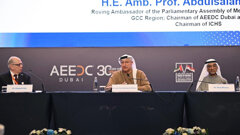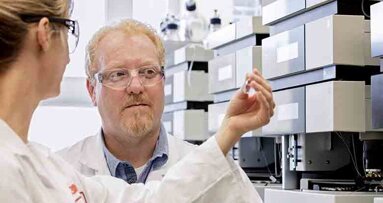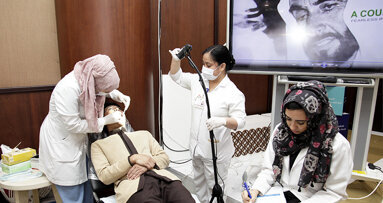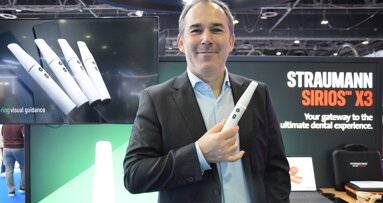COPENHAGEN, Denmark: Though its popularity and constituent ingredients have changed over time, chewing gum has been used by humans for thousands of years. A new study out of Denmark that analysed a 5,700-year-old piece of chewing gum made from birch bark pitch has succeeded in extracting a complete human genome from the pitch, demonstrating its potential as a new source of ancient DNA.
The pitch was found during archaeological excavations carried out by the Museum Lolland-Falster at Syltholm in southern Denmark, and subsequent analysis was conducted by researchers at the University of Copenhagen. Radiocarbon dating of the pitch helped to place it as a specimen from the early Neolithic period in Denmark, while DNA sequencing revealed that it was chewed by a female who was more closely genetically related to the hunter-gatherers of mainland Europe than to those who populated central Scandinavia at the time. It was found that she probably possessed dark skin, dark hair and blue eyes.
Traces of hazelnut and duck DNA were also identified in the pitch, suggesting that these may have formed part of the individual’s diet. The researchers also successfully identified DNA fragments from several bacterial and viral taxa, including the Epstein–Barr virus, which can cause glandular fever.
“[Syltholm] is the biggest Stone Age site in Denmark and the archaeological finds suggest that the people who occupied the site were heavily exploiting wild resources well into the Neolithic, which is the period when farming and domesticated animals were first introduced into southern Scandinavia,” said Dr Theis Jensen, a postdoctoral student at the University of Copenhagen’s Globe Institute and a co-author of the study.
“We managed to extract many different bacterial species that are characteristic of an oral microbiome,” added Dr Hannes Schroeder, associate professor at the Globe Institute.
“Our ancestors lived in a different environment and had a different lifestyle and diet, and it is therefore interesting to find out how this is reflected in their microbiome,” he continued.
Though still a relatively new form of analysis, DNA sequencing from birch bark pitch is growing in popularity, in part owing to its potential to be a good proxy for human bones in archaeogenetic studies. As reported by Dental Tribune International last year, Scandinavian researchers have previously used pitch to sequence DNA from the first humans who settled in the region some 10,000 years ago.
Though a considerable amount of information can be uncovered through the DNA sequencing of pitch, several questions still remain—including the question of what the purpose of chewing it was. Some researchers have suggested that it may have been a method for making the pitch more pliable for further toolmaking purposes, while medicinal and hunger-suppressing uses have also been put forward for consideration.
The study, titled “A 5700 year-old human genome and oral microbiome from chewed birch pitch”, was published on 17 December 2019 in Nature Communications.
RIYADH, Saudi Arabia: Oral cancer constitutes a major front in the global fight against non-communicable diseases, and heightened public awareness of risk ...
KUWAIT CITY, Kuwait: The majority of sugar-free chewing gums containing xylitol that are sold in the Cooperation Council for the Arab States of the Gulf ...
Interview with Dr. Joachim Zech, Head of Research & Development of Dental Impression Materials, 3M Oral Care, Seefeld, Germany
Today’s technological and design innovations have seen the humble dental chair evolve into state-of-the-art treatment centers, putting ergonomics and ...
Under the umbrella of Hospitals Sector in Ministry of Health and Prevention, Al Baraha Hospital held the event under the theme “You are part of us and we ...
DAMASCUS, Syria: As health workers, dentists are occasionally placed at risk of disease transmission, since they are exposed to bloodborne infections of ...
ALEXANDRIA, Egypt: The global push for reaching net-zero emissions has led to a better understanding of the types and volumes of emissions attributable to ...
BURNABY, Canada: Poor oral health has been contributing to a global silent epidemic that countries have been striving to combat for decades. Based on data ...
Dentistry is evolving faster than ever. From digitalisation to changing economic realities, global market changes are redefining how clinicians work and how...
DUBAI, UAE/KRIENS, Switzerland: The oral microbiome is essential for overall health, but traditional antiseptics like chlorhexidine can disrupt its balance....
Live webinar
Tue. 24 February 2026
10:00 pm UAE (Dubai)
Prof. Dr. Markus B. Hürzeler
Live webinar
Wed. 25 February 2026
12:00 am UAE (Dubai)
Prof. Dr. Marcel A. Wainwright DDS, PhD
Live webinar
Wed. 25 February 2026
8:00 pm UAE (Dubai)
Prof. Dr. Daniel Edelhoff
Live webinar
Wed. 25 February 2026
10:00 pm UAE (Dubai)
Live webinar
Thu. 26 February 2026
5:00 am UAE (Dubai)
Live webinar
Tue. 3 March 2026
8:00 pm UAE (Dubai)
Dr. Omar Lugo Cirujano Maxilofacial
Live webinar
Wed. 4 March 2026
5:00 am UAE (Dubai)
Dr. Vasiliki Maseli DDS, MS, EdM



 Austria / Österreich
Austria / Österreich
 Bosnia and Herzegovina / Босна и Херцеговина
Bosnia and Herzegovina / Босна и Херцеговина
 Bulgaria / България
Bulgaria / България
 Croatia / Hrvatska
Croatia / Hrvatska
 Czech Republic & Slovakia / Česká republika & Slovensko
Czech Republic & Slovakia / Česká republika & Slovensko
 France / France
France / France
 Germany / Deutschland
Germany / Deutschland
 Greece / ΕΛΛΑΔΑ
Greece / ΕΛΛΑΔΑ
 Hungary / Hungary
Hungary / Hungary
 Italy / Italia
Italy / Italia
 Netherlands / Nederland
Netherlands / Nederland
 Nordic / Nordic
Nordic / Nordic
 Poland / Polska
Poland / Polska
 Portugal / Portugal
Portugal / Portugal
 Romania & Moldova / România & Moldova
Romania & Moldova / România & Moldova
 Slovenia / Slovenija
Slovenia / Slovenija
 Serbia & Montenegro / Србија и Црна Гора
Serbia & Montenegro / Србија и Црна Гора
 Spain / España
Spain / España
 Switzerland / Schweiz
Switzerland / Schweiz
 Turkey / Türkiye
Turkey / Türkiye
 UK & Ireland / UK & Ireland
UK & Ireland / UK & Ireland
 International / International
International / International
 Brazil / Brasil
Brazil / Brasil
 Canada / Canada
Canada / Canada
 Latin America / Latinoamérica
Latin America / Latinoamérica
 USA / USA
USA / USA
 China / 中国
China / 中国
 India / भारत गणराज्य
India / भारत गणराज्य
 Pakistan / Pākistān
Pakistan / Pākistān
 Vietnam / Việt Nam
Vietnam / Việt Nam
 ASEAN / ASEAN
ASEAN / ASEAN
 Israel / מְדִינַת יִשְׂרָאֵל
Israel / מְדִינַת יִשְׂרָאֵל
 Algeria, Morocco & Tunisia / الجزائر والمغرب وتونس
Algeria, Morocco & Tunisia / الجزائر والمغرب وتونس
























































